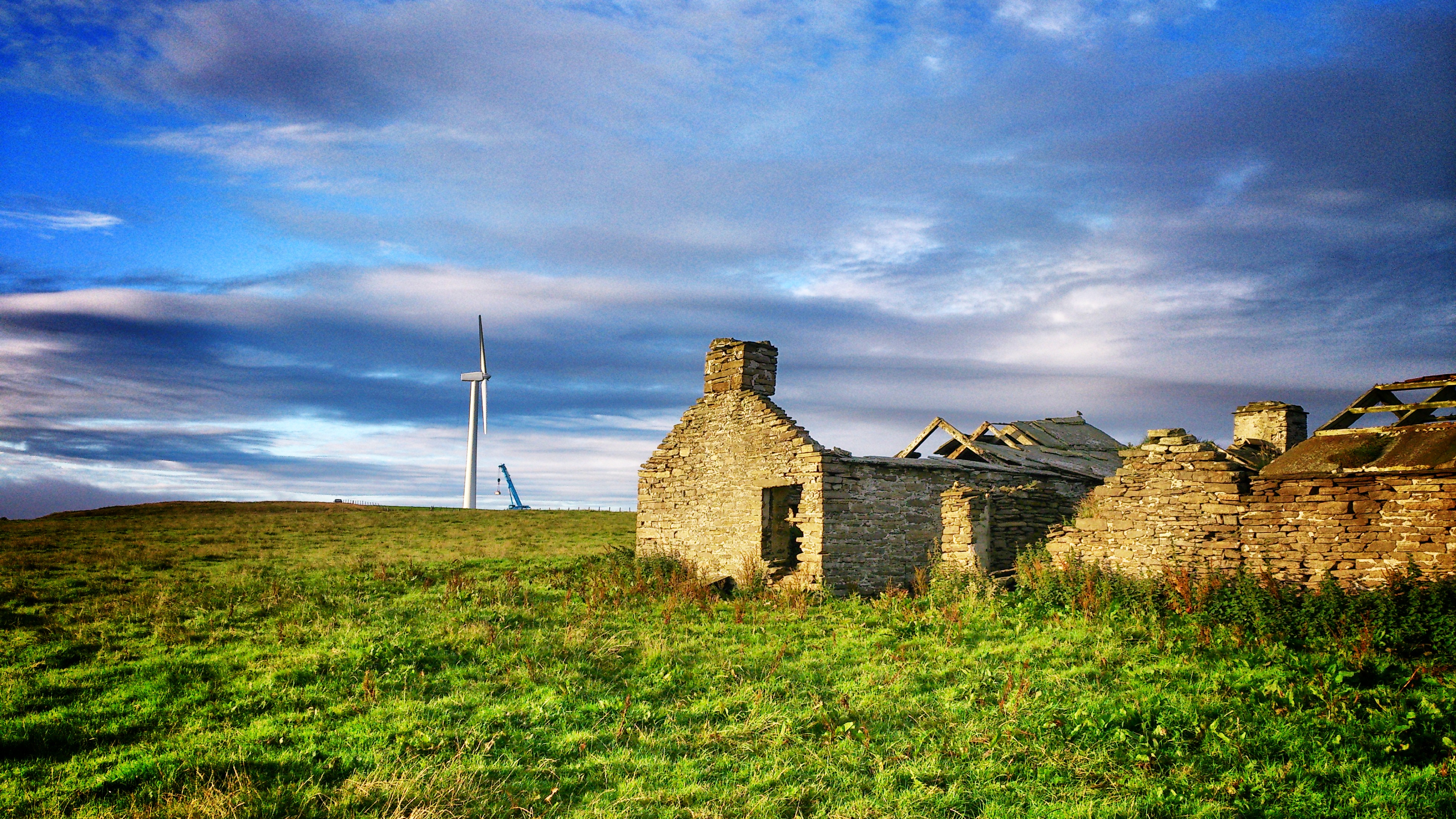UK majority wants more wind farms
This week a new survey by the BBC showed that 67% of the UK are in favour of more wind farms.
Support for nuclear and fracking was significantly lower at below 50%.
The BBC survey also highlighted a "generation gap" with support for renewables strongest among the younger generation. In the 25-34 age group support for wind farms jumped to 82% in favour!
Hardly surprising given who will be still be around to live with the consequences of climate change and energy shortages.
Let's hope the Government and particularly the planning system catch up with public opinion.
DG003 build nearing completion

With just the final electrical connection to go our turbine on the Orkney island of Westray is just a couple of weeks away from final commissioning.
95% sure on climate change say IPCC
95% sure on climate change say IPCC
According to a draft of the yet-to-be-published 5th IPPC report on Climate Change, the certainty that humans are the main cause of climate change has risen to 95 per cent, from 90 per cent in the previous assessment.
The report also predicts sea level rises of almost 1m by the end of this century.
August 23, 2013
Talbot Farm gets go-ahead
After some considerable amount of time in the appeal process the Inspectorate has finally allowed our appeal for a mid-size wind turbine at Talbot Farm overlooking the M4.
The application was refused permission by South Gloucestershire District Council in 2012 who cited unacceptable impacts on landscape and nearby heritage assets. The Inspector disagreed ruling that impacts were "less than substantial" and fully reversible.
The full appeal decision can be downloaded here.
"Unprecedented extremes" in climate
World Meteorological Organisation reports "Unprecedented extremes" in climate
Grim reading indeed.
July 8, 2013
BBC Horizon: Fracking
This weeks episode of Horizon provided an excellent primer into the technology and possible side effects of this controversial new energy source. Ian Stewart presented the information in an unbiased and concise manner.
The question he left hanging - Just because we can, does it mean we should?
The immediate financial rewards from fracking may be substantial - or not depending who you are. However, basing our energy policy for the next decades on yet another fossil fuel seems madness.
June 20, 2013
First community payout from Rogershill
Way back in 2010 we presented details of our Rogershill Farm wind turbine to the both the Parish Council and general community of Bere Regis. At the time we made a public commitment to make generous community reward payments to the council for re-investment back into local good causes - not just once, but every year for the life of the wind turbine.
The Rogershill wind turbine received planning permission in late 2011 and was finally commissioned in November 2012.
We are now delighted to come good on our promise and make the first donation to the Parish Council for the sum of.....
... covering the first 4 months of operations. We understand that the donation will be initially be used towards a "kick wall" and outdoor gym for local children! We hope this is just the start of a series of new projects that our funding will make possible.
Last week, in conjunction with announcements regarding new planning guidance from DCLG (Department for Communities and Local Government), DECC announced that wind farms should increase the level of annual community rewards fivefold - from £1000 to £5000 per megawatt (MW). Based on current forecasts we expect the 500kW Rogershill turbine to return an equivalent of over £10,000 per MW per year!
Sad day for CO2 targets
Yesterday's failure in the House of Commons to secure legal targets for de-carbonisation are a blow to environmentalists and would-be investors in green tech alike.
Tory MP Tim Yeo had tabled an amendment (to the new Energy Bill) requiring hard targets for CO2 reduction measures be decided by 2014 that proved unpopular with the Treasury, preferring as they do to back shale (aka fracking) and convetional gas as a "quick fix" and to defer any decisions until after 2016. No surprise there as No. 10's new energy adviser turns out to be an ex-gas company lobbyist!
The amendment was largely supported by green and wildlife groups, the renewables industry, Labour, SNP and the Green Party but was narrowly voted down by just 23 votes because, tweeted Labour leader Ed Milliband:
"Only about 15 Lib Dems backed their own policy of decarbonising the economy by 2030 in Commons vote. Huge missed opportunity"
Last month, government adviser the Committee on Climate Change (CCC) suggested that the carbon intensity of power generation be reduced to an average 50 grams of carbon dioxide (CO2) per kilowatt hour by 2030 from the current 500 gCO2/kWh.
The CCC said this would limit new gas-fired power plants after 2020, unless they are fitted with the as yet commercially unproven carbon capture and storage (CCS) technology or else as back-up for intermittent renewables.
Friends of the Earth head campaigner Andrew Pendleton commented:
"Investors say that they need certainty so they can make long-term investments in clean British energy. Without it we risk losing business overseas to countries that have made a clear commitment to developing a low-carbon future."
..and as if to echo this exact sentiment a new report shows investment in green energy has fallen to a seven year low.
Wind hits 10% of UK power demands
According to gridwatch, wind power is supplying 10% of UK electricity needs (at around 5GW) this morning! Nuclear 8GW, Coal 14GW, Gas 10GW.
Follow the link to gridwatch here.
Keeping the lights on
OFGEM report today that UK electricity generation capacity will drop by 10%..
Not this year... but by this April
This is despite several ageing nuclear power stations continuing to run well past their intended life span. George Osbourne's new dash-for-gas it likely to represent only a short term fix as wholesale prices for imported gas continue to rise. In the meantime even some Tories has described the current policy as "short sighted and costly".
As we have long argued, the UK needs to rapidly install as much renewable capacity as it possibly can - and quickly. While no one technology holds the answer the simple truth is that we need a lot more of everything - wind, solar, hydro, tidal, biomass just to keep the lights on, let alone to meet our future electricity needs.
UPDPATE (24/02/2013)
The Sunday Express today reports that nearly 1 million homes faced power cuts in January as National Grid scrambled to find enough electricity during the cold weather. The article claims that old power stations (currently due for imminent closure) were bought back on line to make up the shortfall. If the same happens again next year some parts of the UK could face black outs.
